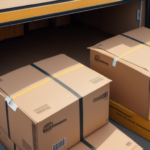Streamlining Customs Business with Supply Chain Solutions
As businesses worldwide continue to embrace digitization, streamlining customs operations has become more crucial than ever. Supply chain solutions have emerged as a vital component in managing the complexities of customs compliance. By leveraging these solutions, businesses can significantly reduce both time and costs in the long run.
Why Supply Chain Solutions are the Key to Streamlining Customs Business
Supply chain solutions offer businesses a centralized platform to manage every aspect of their supply chain, from order processing to delivery. These platforms facilitate seamless information exchange among different stakeholders, fostering collaboration and efficiency. By streamlining the entire customs process, supply chain solutions enable businesses to focus on their core competencies, leading to enhanced profitability through minimized errors and a more efficient flow of goods.
Additionally, supply chain solutions provide real-time visibility into supply chain operations. Businesses can track shipments, monitor inventory levels, and identify potential bottlenecks, allowing for informed decision-making and proactive issue resolution. This not only boosts supply chain efficiency but also enhances customer satisfaction by offering accurate and timely order information.
The Role of Technology in Supply Chain Solutions for Customs Business
Integrating technology into supply chain solutions offers significant advantages for customs operations. These solutions enable real-time tracking of container shipments and provide status update alerts. Automating routine tasks such as invoice generation, shipment tracking, and documentation handling reduces the risk of human error, thereby increasing overall efficiency.
Moreover, technology enhances communication and collaboration among all parties involved in the supply chain. Digital platforms and tools allow customs brokers, freight forwarders, and other stakeholders to share information effortlessly and coordinate activities effectively. This improved visibility and control over the supply chain help reduce costs and elevate customer satisfaction.
How to Choose the Right Supply Chain Solution for Your Customs Business
Selecting the appropriate supply chain solution is pivotal for optimizing customs operations. Begin with a comprehensive assessment of your current customs processes, including data flows, shipment volumes, and specific business requirements. Based on this analysis, choose a solution that aligns with your needs and works seamlessly with your existing IT systems.
Key factors to consider include the level of automation offered by the solution. Automated processes can streamline customs operations, reduce errors, and enhance efficiency. Look for solutions that automate tasks such as data entry, document generation, and compliance checks. Additionally, consider the scalability of the solution to accommodate future business growth, ensuring it can handle increased shipment volumes and data demands.
Benefits of Using Supply Chain Solutions for Customs Business
- Cost and Time Reduction: Streamlines the customs clearance process, reducing both costs and the time required.
- Error Minimization: Automated processes decrease the likelihood of human errors.
- Enhanced Customer Satisfaction: Real-time shipment tracking provides customers with accurate and timely information.
- Regulatory Compliance: Ensures adherence to customs regulations, helping businesses avoid penalties.
- Improved Supply Chain Visibility: Facilitates informed decision-making through real-time data and analytics.
Moreover, supply chain solutions aid in regulatory compliance by providing the necessary tools to follow all customs regulations and requirements, such as proper documentation and labeling. This compliance helps businesses avoid costly fines and delays in the customs clearance process.
Access to real-time data and analytics allows businesses to identify areas for improvement and optimize supply chain processes, leading to increased efficiency, reduced costs, and improved customer satisfaction.
Case Studies: Successful Implementation of Supply Chain Solutions in Customs Business
Numerous businesses have effectively integrated supply chain solutions into their customs operations. For instance, a global importer of perishable goods implemented a cloud-based supply chain solution that enabled shipment tracking from farm to warehouse to retailers. This integration improved shipment visibility, reduced manual processes, and enhanced the overall customer experience.
Similarly, a leading electronics manufacturer adopted a supply chain solution to optimize inventory management and reduce lead times. Utilizing real-time data and analytics, they identified areas for improvement and made data-driven decisions, resulting in significant reductions in inventory costs and an increase in on-time deliveries to customers.
Streamlining Import and Export Processes with Supply Chain Solutions
Managing import and export processes can be challenging, but supply chain solutions simplify and automate these tasks. By automating documentation and integrating with customs brokers, businesses can handle the entire customs process in a single platform, enhancing throughput and minimizing delays.
Real-time shipment tracking, enabled by GPS and other tracking technologies, allows businesses to monitor their shipments' location and status at any given time. This capability improves communication with customers and provides more accurate delivery estimates.
Furthermore, supply chain solutions assist in optimizing inventory management. Analyzing demand patterns and supply chain data enables businesses to make informed decisions about inventory ordering, leading to reduced inventory costs and improved cash flow.
Mitigating Risks and Improving Compliance with Supply Chain Solutions in Customs Business
Supply chain solutions not only streamline customs processes but also help mitigate risks associated with import and export operations. These solutions facilitate risk assessments and ensure that all necessary permits and documents are in place, maintaining compliance with customs regulations and avoiding fines and reputational damage.
Real-time tracking and monitoring of goods in transit enhance visibility and control over the supply chain, reducing the risk of theft, damage, or loss. Alert systems notify businesses of any unexpected events or delays, allowing for swift corrective actions.
Additionally, supply chain solutions optimize logistics and reduce costs by streamlining processes and improving efficiency. This optimization includes better transportation route planning, reduced inventory levels, and enhanced communication and collaboration with suppliers and partners.
Top Providers of Supply Chain Solutions for Customs Business
Several leading providers offer advanced supply chain solutions tailored to customs operations, including BluJay Solutions, Descartes Systems Group, and WiseTech Global. These providers deliver cutting-edge technologies suitable for businesses of all sizes. It's essential to evaluate these providers based on your specific business requirements to select the most appropriate solution.
BluJay Solutions specializes in supply chain software and services designed to optimize supply chain operations, enhance visibility, and reduce costs. Their offerings include transportation management, warehouse management, and customs management solutions.
Descartes Systems Group provides a wide range of supply chain solutions, including transportation management, customs and regulatory compliance, and global logistics network services. Their solutions help businesses streamline supply chain operations and improve visibility across all stages.
Best Practices for Implementing Supply Chain Solutions in Your Customs Business
Successfully implementing supply chain solutions in your customs business requires meticulous planning and execution. Follow these best practices to ensure a smooth integration:
- Assess Current Operations: Prioritize processes that need streamlining by evaluating existing customs operations, including data flows and shipment volumes.
- Select the Right Vendor: Partner with a reputable vendor that offers customization, robust technical support, and compatibility with your current IT systems.
- Plan for Automation: Choose a solution that offers automation for tasks like data entry, document generation, and compliance checks to enhance efficiency.
- Ensure Scalability: Select a solution that can scale with your business growth, handling increased shipment volumes and data requirements.
- Implement Training and Resources: Provide adequate training and resources to your team to ensure they can effectively use the new solution.
- Conduct Thorough Testing: Test the solution before full deployment to identify and address any potential issues, ensuring a smooth rollout.
- Monitor and Improve: Regularly evaluate the solution's performance and make continuous improvements to maintain long-term success.
In summary, supply chain solutions are indispensable for modern customs businesses. They offer the tools needed to streamline processes from documentation to clearance, integrate advanced technologies to minimize errors, and ensure regulatory compliance. By carefully selecting the right vendor and implementing these solutions with strategic planning, businesses can maximize the benefits and drive sustained growth.
Data security is a critical consideration when implementing supply chain solutions. With the increasing reliance on technology in supply chain management, the risk of cyber attacks and data breaches grows. Ensure that your chosen solution includes robust security measures such as encryption, firewalls, and regular security audits to protect both your business and your customers' data. Prioritizing data security helps mitigate the risk of costly and damaging breaches.






















